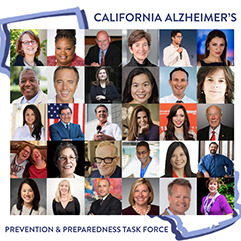UC Davis specialists to serve on statewide Alzheimer's Disease Task Force
August 9, 2019
Gov. Gavin Newsom announced today that he has established an Alzheimer’s Disease Task Force to address the challenges of dementia.

Governor Newsom's new Alzheimer's Disease Task Force includes David Lubarsky and Oahn Le Meyer from UC Davis Health.
The state’s former first lady Maria Shriver is leading the initiative, which aims to raise awareness and develop a plan to manage the expected rise in Alzheimer’s disease as the population ages.
“This task force will lay out a path for our state to deal with Alzheimer’s and other aging-related diseases,” Shriver said. “Our mission is to develop a plan that will disrupt the way we deal with Alzheimer’s and change how citizens, politicians, cities, corporations and community organizations work together to tackle this disease.”
Vice Chancellor David Lubarsky and Oanh Le Meyer, a UC Davis assistant professor of neurology who studies cognitive and mental health disparities in minorities and older adults, are on the task force.
“Alzheimer’s disease impacts everyone, which is why I'm honored to join a wide coalition of medical professionals, caregivers, policy makers, youth and nonprofit leaders to work collaboratively to end Alzheimer’s for all,” Lubarsky said.
UC Davis Health is home to the UC Davis Alzheimer's Disease Center, which is one of only 27 research centers designated by the National Institutes of Health's National Institute on Aging. The center conducts comprehensive patient evaluations and leading-edge research to advance understanding of Alzheimer’s disease and related dementias.
Many studies are underway to assess dementia and its toll across diverse populations.
- The KANDLE study aims to define ethnic disparities in dementia incidence by assessing early and midlife risk factors for cognitive impairment and markers of brain injury found on MRI imaging studies.
- The Life After 90 study seeks to learn about dementia and brain pathology in very old people and the role that early life influences have on the risk of very late-onset dementia, including in ethnic minorities.
- The U.S. POINTER study examines whether exercise, diet, mentally challenging tasks and regular health monitoring can improve brain health.
Gerontology specialists in the Department of Psychiatry and Behavioral Sciences and the Betty Irene Moore School of Nursing also have been sharing their knowledge of best practices with providers and caregivers in Vietnam – a country with one of the fastest growing aging populations in the world.
“As we work to fight Alzheimer’s disease, it is important that we pursue both cures and prevention,” Lubarsky said. “More research is essential to help those with the disease, but we already know that it’s also important to promote healthy habits throughout a person’s life.”
Read more about the governor’s Alzheimer’s Disease Task Force.

